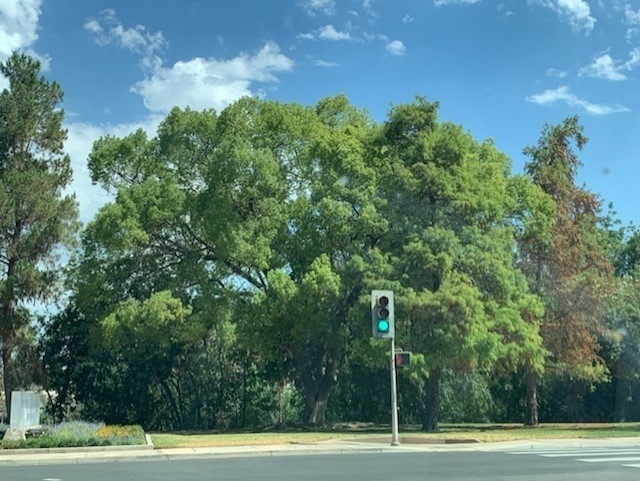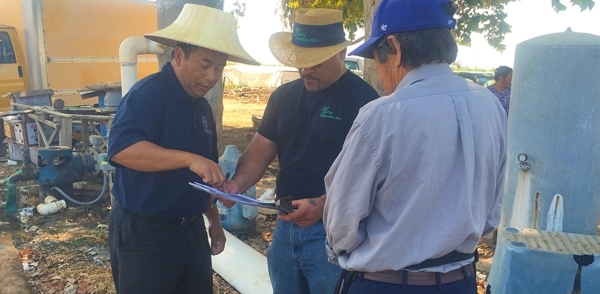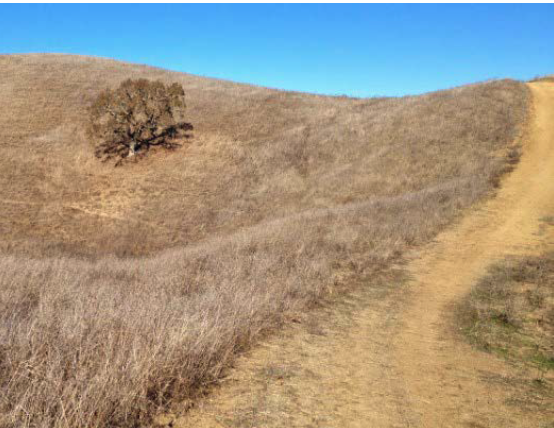Posts Tagged: Rachael Long
Lawn-pocalypse! Surviving Drought
Ah, summer! The season of sunburns, pool parties, and… lawn droughts. If your once lush, green carpet now looks like a crunchy brown doormat, you're not alone. Let's dive into why your yard is staging a dramatic death scene and what you can do to...

Bermuda grass and weeds overtaking drought stressed turf grass.
Long, Mueller and Smith honored for career achievements
Since 1973, the California Chapter of the ASA has recognized individuals who have made significant contributions to California agriculture during their careers.
As California ASA past president, Michelle Leinfelder-Miles congratulated her UCCE colleagues, all of whom have been granted emeritus status by the university.
“I wish to start off by personally thanking them for their knowledge, experience, commitment to service and mentoring,” said Leinfelder-Miles, who is also UCCE Delta crops resource management advisor for San Joaquin, Sacramento, Yolo, Solano and Contra Costa counties. “You have made a tremendous impact on my career, and, without a doubt, on the careers and lives of many.”
Long retired as a UCCE farm advisor in 2023, after 37 years of doing research on crop production, pollination and pest control in collaboration with farmers, starting in Sonoma County, then San Joaquin County and the last 32 years in Solano, Sacramento and Yolo counties.
“She worked extensively with farmers over the years, learning about global positioning systems (GPS), subsurface drip and healthy soils practices,” said Sarah Light, UCCE agronomy farm advisor for Sutter, Yuba and Colusa counties, who presented Long's award.
“Rachael's work in the late 1990s documented how pesticides were transported offsite from farm fields in surface irrigation water,” Light said, noting Long's research led to the adoption of practices – such as pesticide choice and vegetative filter strips including cover crops – that are now commonly used to protect surface waters from pesticides used on farms. She is currently writing a children's book introducing them to the world of bees.
Mueller, who retired in 2019, was a UCCE advisor in Fresno County and director of the UCCE Fresno/Madera Multi-County Partnership.
“Throughout her 31-year career, Shannon exemplified professionalism on every research project, extension effort, committee, advisory board or workgroup with which she was involved,” said Carol Frate, emeritus UCCE farm advisor, who presented Mueller's award. “The results of Shannon's work with alfalfa seed and pollination resulted in practices used to this day.”
Smith retired as a UCCE vegetable crops advisor in January 2023, but continues to contribute his expertise. Initially hired in 1987 as a UCCE vegetable crop farm advisor in Stanislaus County, Smith transferred to San Benito County in 1989 as the small farms advisor. His role later expanded to UCCE vegetable crops and weed science farm advisor for San Benito, Monterey and Santa Cruz counties.
“Throughout his career, Richard made thousands of farm call visits to assist growers, PCAs and crop consultants with diagnosing crop production problems caused by abiotic conditions, diseases, insects, nutrient deficiency, salinity or chemical sprays,” said Michael Cahn, UCCE irrigation and water resources advisor for the Central Coast, who presented Smith's award. “Richard has also been at the forefront of solving major problems facing the vegetable industry on the Central Coast. One of the most recent and impactful issues was the major loss of lettuce production in 2020 caused by impatiens necrotic spot virus (INSV) and Pythium wilt disease.”
Leinfelder-Miles remarked, “It is rare for the chapter to recognize three UC academics in one year, let alone three Cooperative Extension farm advisors.”
Read the full remarks about the extraordinary contributions Long, Mueller and Smith have made to agriculture in the California Plant and Soil Conference Book of Abstracts posted online at https://na-admin.eventscloud.com/docs/9711/409497.
Rachael Long retires as UCCE farm advisor after 37 years
Long's research on crops, pollination and pest control guided farming practices in Yolo, Solano and Sacramento counties
Rachael Freeman Long grew up in Berkeley but was fascinated by farming. The UC Cooperative Extension farm advisor has spent the past 37 years doing research on crop production, pollination and pest control and collaborating with farmers.
Long worked with UCCE in Sonoma and San Joaquin counties as well as at UC Berkeley, before settling in Yolo County as a farm advisor in 1992. She has focused on field crops including alfalfa hay and other forages, dry beans, and hybrid seed crops such as sunflowers, melons and onions.
She plans to retire July 1 after serving growers in Yolo, Solano and Sacramento counties for 31 years.
Long's pest management studies highly influential
“Rachael has been a wonderful addition to our life in Yolo County, as well as to the whole farming community throughout the UCCE,” wrote walnut growers Dan and Sarah Hrdy. “Her enthusiasm and dedication to bees, birds and bats is wonderful.”
To produce practical research results, Long has collaborated on studies with the Hrdys and many other growers over the years. Her field studies informed the sunflower, alfalfa, onion seed and dry bean production manuals that she co-authored with UC ANR colleagues.
Cost-of-production reports on alfalfa, sunflowers, lima beans, common beans and garbanzo beans that she co-authored have been used by growers for obtaining farm loans. Since 2014, her cost studies have been used over 50,000 times.
Long's research and extension of integrated pest management practices have resulted in enhanced biodiversity, reduced pesticide use, higher crop yields, healthy soils and carbon sequestration, and greater farm productivity and profitability. Her research papers have been cited by scientists over 1,200 times. She was the recipient of the Bradford Rominger Agricultural Sustainability Leadership Award in 2019.
Adoption of new farming practices
Her work in the late 1990s documented how pesticides were transported offsite from farm fields in surface irrigation water. At the time, the agricultural industry was concerned the results would prompt increased regulations and restrictions on farming practices. But she persisted and her research led to the development and adoption of practices – such as pesticide choice and vegetative filter strips including cover crops – that are now commonly used to protect surface waters from pesticides used on farms.
“I'm proud of my community and appreciate the opportunity to work with farmers and the privilege of conducting research on farms,” Long said. “I'll forever be grateful to landowners for their support of my projects, even ones that seemed so far out there, like studying bats and pest control in walnut orchards!”
Her research has shown that bats, as well as insectivorous birds, help control insect pests on farms, which helps growers reduce their reliance on pesticides.
As scientists look for ways to slow climate change, one of Long's recent studies revealed that hedgerows sequester 36% more carbon than farmed areas.
“I loved working with students and postdocs on hedgerows,” she said. “We found that field edge plantings of native plants provide floral resources for natural enemies and bees that move into adjacent crops for enhanced pollination and pest control services in adjacent crops, reducing pesticide use and boosting yields. I'm proud that many have gone on to pursue careers in agriculture and natural resource conservation.”
Hedgerows become conservation practice
Mary Kimball, CEO of the Center for Land-Based Learning in Woodland, was Long's field assistant in 1996. Kimball, who worked for the Yolo Resource Conservation District, was the project manager for the first hedgerow project that Long led.
“Over the years, Rachael has strategically and methodically tackled every question, concern and potential barrier for on-farm hedgerow installation – not only disproving all of the myths about pests, but showing the dramatic importance of these native plant hedgerows to everything from wildlife habitat, insectary value, use by bird species, and most recently, carbon sequestration,” Kimball said.
“As a result, hedgerows are now by far the most applied-for conservation practice by farmers and landowners through USDA Natural Resources Conservation Service cost-sharing programs across the state,” Kimball added. “Her impact and the way that she went about doing this research – in collaboration and with all needs and concerns of the farmer in mind – show us how to tackle new ideas and ensure their sustainability over time.”
Lifelong interest in agriculture evolves with technology
The daughter of a UC Berkeley biology professor and graduate of UC Berkeley with a B.S. in biology and UC Davis with an M.S. in entomology, Long always had an interest in wildlife, conservation and exploring the natural world.
“I've always been interested in agriculture, probably from spending summers as a kid with family in Sonoma County,” she said. “However, what totally sparked my interest in crop production was hearing a farm advisor talk about integrated pest management when I was in college. I found that so inspiring that I changed my major from pre-med to agriculture, a great decision, not only for my career, but I met my husband through work and we currently live and farm here in the Woodland area.”
For a recent project addressing labor shortages, she developed research-based guidelines for growers to use spray drones to control pests in alfalfa hay production.
As a mother and a scientist, Long is committed to piquing children's interest in science. She has published three children's books chronicling a boy's adventures with wildlife, based on stories she told her own son, Eugene. Long recently published “See You Later Alligator,” an online children's book.
In retirement, Long is looking forward to having more time to write kids' books focusing on science literacy and “sharing more about how to respect and live with wildlife for everyone's safety – animals and people.”
“Next is a high adventure story that brings kids into a world of bees!” Long said. “I'm super excited with this ArcGIS storymap format to share online with kids! It's a great teaching opportunity maps, illustrations, and a storyline, along with discussion questions to engage kids!” Long and colleagues recently created a storymap on Native Bees.
Long, who received prestigious emeritus status from UC Agriculture and Natural Resources, will also finish up some research projects.
Climate-Change Resources
University of California UC ANR Green Blog (Climate Change and Other Topics) https://ucanr.edu/blogs/Green/index.cfm?tagname=climate%20change (full index)
Examples:
- Save Trees First: Tips to Keep Them Alive Under Drought https://ucanr.edu/b/~CdD
- Landscaping with Fire Exposure in Mind: https://ucanr.edu/b/~G4D
- Cities in California Inland Areas Must Make Street Tree Changes to adapt to Future Climate https://ucanr.edu/b/~oF7
Drought, Climate Change and California Water Management Ted Grantham, UC Cooperative Extension specialist (23 minutes) https://youtu.be/dlimj75Wn9Q
Climate Variability and Change: Trends and Impacts on CA Agriculture Tapan Pathak, UC Cooperative Extension specialist (24 minutes) https://youtu.be/bIHI0yqqQJc
California Institute for Water Resources (links to blogs, talks, podcasts, water experts, etc.) https://ciwr.ucanr.edu/California_Drought_Expertise/
UC ANR Wildfire Resources (publications, videos, etc.) https://ucanr.edu/News/For_the_media/Press_kits/Wildfire/ (main website)
-UC ANR Fire Resources and Information https://ucanr.edu/sites/fire/ (main website)
-Preparing Home Landscaping https://ucanr.edu/sites/fire/Prepare/Landscaping/
UC ANR Free Publications https://anrcatalog.ucanr.edu/ (main website)
- Benefits of Plants to Humans and Urban Ecosystems: https://anrcatalog.ucanr.edu/pdf/8726.pdf
-Keeping Plants Alive Under Drought and Water Restrictions (English version) https://anrcatalog.ucanr.edu/pdf/8553.pdf
(Spanish version) https://anrcatalog.ucanr.edu/pdf/8628.pdf
- Use of Graywater in Urban Landscapes https://anrcatalog.ucanr.edu/pdf/8536.pdf
- Sustainable Landscaping in California https://anrcatalog.ucanr.edu/pdf/8504.pdf
Other (Non-UC) Climate Change Resources
Urban Forests and Climate Change. Urban forests play an important role in climate change mitigation and adaptation. Active stewardship of a community's forestry assets can strengthen local resilience to climate change while creating more sustainable and desirable places to live. https://www.fs.usda.gov/ccrc/topics/urban-forests
Examining the Viability of Planting Trees to Mitigate Climate Change (plausible at the forest level) https://climate.nasa.gov/news/2927/examining-the-viability-of-planting-trees-to-help-mitigate-climate-change/
Reports and other information resources coordinated under the auspices of the United Nations and produced through the collaboration of thousands of international scientists to provide a clear and up to date view of the current state of scientific knowledge relevant to climate change. United Nations Climate Action
Scientific reports, programs, action movements and events related to climate change. National Center for Atmospheric Research (National Science Foundation)
Find useful reports, program information and other documents resulting from federally funded research and development into the behavior of the atmosphere and related physical, biological and social systems. Search and find climate data from prehistory through to an hour ago in the world's largest climate data archive. (Formerly the "Climatic Data Center") National Centers for Environmental Information (NOAA)
Think tank providing information, analysis, policy and solution development for addressing climate change and energy issues (formerly known as the: "Pew Center on Global Climate Change"). Center for Climate & Energy Solutions (C2ES)
Mapping Resilience: A Blueprint for Thriving in the Face of Climate Disaster. The Climate Adaptation Knowledge Exchange (CAKE) was launched in July 2010 and is managed by EcoAdapt, a non-profit with a singular mission: to create a robust future in the face of climate change by bringing together diverse players to reshape planning and management in response to rapid climate change. https://www.cakex.org/documents/mapping-resilience-blueprint-thriving-face-climate-disaster
Cal-Adapt provides a way to explore peer-reviewed data that portrays how climate change might affect California at the state and local level. We make this data available through downloads, visualizations, and the Cal-Adapt API for your research, outreach, and adaptation planning needs. Cal-Adapt is a collaboration between state agency funding programs, university and private sector researchers https://cal-adapt.org/
Find reports, maps, data and other resources produced through a confederation of the research arms of 13 Federal departments and agencies that carry out research and develop and maintain capabilities that support the Nation's response to global change. Global Change (U.S. Global Change Research Program)
The Pacific Institute is a global water think tank that combines science-based thought leadership with active outreach to influence local, national, and international efforts to develop sustainable water policies. https://pacinst.org/our-approach/
Making equity real in climate adaptation and community resilience policies and programs: a guidebook. https://greenlining.org/publications/2019/making-equity-real-in-climate-adaption-and-community-resilience-policies-and-programs-a-guidebook/
Quarterly CA Climate Updates and CA Drought Monitor Maps (updated each Thursday) https://www.drought.gov/documents/quarterly-climate-impacts-and-outlook-western-region-june-2022
Drought focus of Water Resources IMPACT magazine special issue
UC ANR experts address emotional toll of drought
Preparing the American West for prolonged drought is the focus of a double issue of Water Resources IMPACT magazine. The California Water Commission staff are guest editors for this special open-access edition of the magazine, which is published by the American Water Resources Association.
Faith Kearns, academic coordinator of University of California Agriculture and Natural Resources' California Institute for Water Resources, is among the authors delving into how drought impacts people and the environment and how we can better prepare for the inevitable.
The first issue, published on Feb. 14, focuses on water scarcity issues confronting California and the ways these issues affect different sectors.
In “Trauma, Care, and Solidarity: Addressing the Emotional Toll of Chronic Drought,” Kearns highlights the effects of drought on mental health. She points to the spike in suicide hotline calls when wells ran dry in Southeast Asian communities in California's Central Valley.
By listening to Southeast Asian farmers, Ruth Dahlquist-Willard and Michael Yang of UC Cooperative Extension were able to “lighten the load” for them by providing pragmatic support, Kearns writes.
“The scale of some of these highly emotional issues – drought, wildfires, climate change – can make them seem incredibly difficult, if not impossible, to deal with,” Kearns said. “At the same time, they are affecting everyone living in the western U.S. on a daily basis. I wanted to highlight and provide models based on work that people – whether they are researchers, clinical psychologists, or Cooperative Extension advisors – are doing right now to ease the way.”
The authors who contributed to the double issue are a diverse array of Tribal experts, academics, nongovernmental organization thought-leaders, water managers and water policy influencers, each of whom brings their own perspective on the topic of drought. Their expertise and perspectives in climate science, water policy and water management will help inform drought-related decision-making and support policies that better prepare the state to thrive during periods of prolonged water scarcity.
In addition to Kearns, the first issue includes articles contributed by:
- Samantha Stevenson, University of California, Santa Barbara
- Jay Lund, University of California, Davis
- Ron Goode, North Fork Mono Tribe
- Andy Fecko, Placer County Water Agency
- Jeff Mount, Public Policy Institute of California, and Ted Grantham, University of California, Berkeley/UC Cooperative Extension
- Nat Seavy and Karyn Stockdale, National Audubon Society
- Kjia Rivers, Community Water Center
- Cannon Michael, Bowles Farming
- Michelle Reimers, Turlock Irrigation District
The January/February edition of Water Resources IMPACT magazine can be accessed, free of charge, on the American Water Resources Association website at https://www.awra.org under “Publications.”
The second issue, to be published in March, will focus on drought response, considering the options for adaptation. This two-part series complements the Commission's work on strategies to protect communities and fish and wildlife in the event of a long-term drought.












